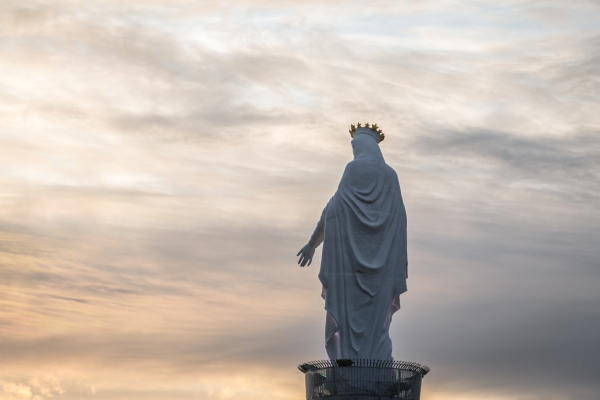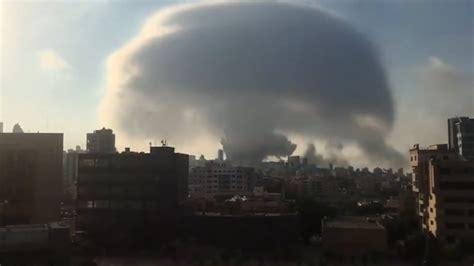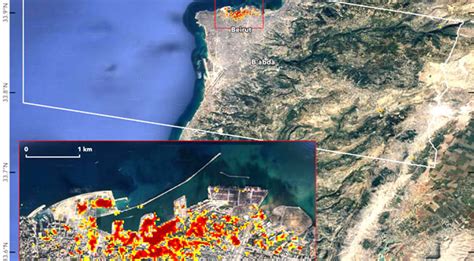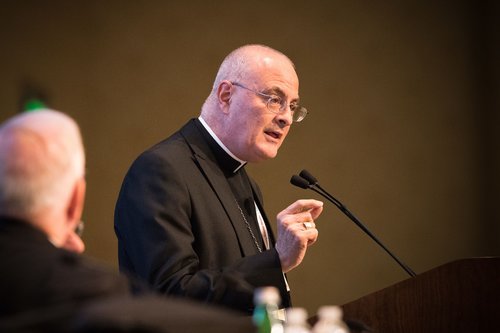![]()

Statue of Our Lady of Lebanon in Harissa, Lebanon. This shrine, a pilgrimage destination for Christians and Muslims alike, could become a place from which a new vision for a peaceful and prosperous Lebanon could emerge. The statue was brought from France in 1908.

The cloud from the August 4, 2020 explosion in the harbor of Beirut, Lebanon

NASA’s Advanced Rapid Imaging and Analysis (ARIA) team used satellite-derived synthetic aperture radar data to map the likely extent of damage from a massive August 4, 2020, explosion in Beirut. (NASA image) Dark red pixels represent the most severe damage. Areas in orange are moderately damaged. Each pixel represents an area of 30 meters (33 yards)
Lebanon Report #3, September 2, 2021
“Why should Lebanon be given any attention at present?
“Allow me to submit before you a controversial contention: Lebanon is in fact at the epicenter of the single, abiding, and most central cause in the entire Arab and indeed Islamic worlds.
“This uniquely pivotal and most pressing issue in the wider Middle East region, as my proposition posits, is not the Palestinian question, or the Israeli-Palestinian conflict, or oil and energy, or big-power geostrategic competition, or matters of development and economic advancement, or even the region-wide Sunni-Shiite showdown…
“The paramount and urgent challenge in the Arab, Turkish, and Persian domains is the persistent, glaring, and deepening freedom deficit…
“The reason why Lebanon is special, nay unique, when it comes to freedoms is that it is home to the only remaining ancient, free, rooted, indigenous, and non-dhimmi Christian community in the entire Middle East, whereas all other native Christians have at some point or other in their turbulent histories succumbed to second-class dhimmi subjugation under Islamic rule, lost their freedoms, and have never regained them…
“Helping Lebanon to stand on its feet economically and financially following decades of corruption and theft by the country’s kleptocratic ruling political class… would contribute tangibly to the single greatest cause as well as future hope for this region: Freedom…
“Lebanon should be propped up in every available way. Do not let the Lebanese people down, and do not make them pay even further for the destruction brought on by an insensitive, callous, indeed heartless kleptocracy whose insatiable hunger for ill-gotten riches and power betrayed the people and the country.”
—Habib C. Malik, Ph.D., speech delivered at the Transatlantic Leadership Network’s Conference “Turmoil in the Middle East: The U.S. Role and Future Scenarios,” held at the United States House of Representatives on Friday, February 7, 2020. (link) Malik is Associate Professor of History and Cultural Studies at the Lebanese American University in Beirut. He was born in Washington, D.C., on January 13, 1954. He has both US and Lebanese citizenship
***
“If Lebanon were left alone, it would have a chance. The country could become rich again. This is what 90% of people want, just a normal economy and a better life for their kids. Instead, there seems to be this web of dark influences.” — Dr. David Elkins, Head of Emergency Operations for Caritas Lebanon, in an interview in late August 2021, for our “Friends of Lebanon” newsletter
***
“The sound was the kind of sound that I remember from Iraq. It’s hard to describe, almost an evil sound… Then all of the windows shattered. When the glass shatters, it’s like a dozen knives being thrown at you simultaneously.”— Dr. Elkins, speaking in the same interview about his memories of the terrible port explosion in Beirut, Lebanon on August 4, 2020
***
Note from Robert Moynihan:
We are persuaded we must do everything in our power to assist the Christian community in Lebanon, both Catholic and Orthodox. We will be seeking support in the Orthodox world, hoping this project may become a model of Catholic-Orthodox collaboration.
To support our Friends of Lebanon project, click here. Your help is needed now more than ever before. Thank you in advance for your generosity. We know you have many other concerns and obligations, but Lebanon right now is clearly an important cause.
Indeed, as some believe, it may be the single most important cause for the future of the Middle East. —RM
Note: we will have a Zoom virtual Lebanon Meet & Greet tomorrow, Friday, September 3, 2021 at 11:00 a.m. Eastern. We would like for you to join us. Click the button below to register to join this free Zoom event.
SEPTEMBER 2, 2021
LEBANON REPORT #3
By Christopher William Hart-Moynihan
Director, Friends of Lebanon Project
Speaking with Dr. David Elkins, you would be hard-pressed to guess that he spends his days dealing with an unending series of intractable problems. “I enjoy it,” he says, laughing. “I love getting up every day and going to the office, figuring out how we’re going to make this work today.”
Dr. Elkins is the Head of Emergency Operations for Caritas Lebanon, based in Beirut.
Married to a Maronite Catholic, Elkins had visited his wife’s family in Lebanon many times before moving to Beirut in 2019.
“People would talk about what was happening in the rest of the Middle East, in places like Syria and Iraq,” he remembers. “Now the same things are happening here.”
After a multi-decade career in the humanitarian field that took him to multiple hotspots worldwide, Elkins now finds himself at the eastern edge of the Mediterranean Sea, on the doorstep of the European Union (Cyprus is just a 40-minute flight away, Athens a bit further, about 2 hours by plane), in the midst of a crisis that rivals anything he has seen in Tajikistan, Kyrgyzstan, Kenya, Indonesia, or Iraq.
“People are wondering if there is any light at the end of this very dark tunnel,” he says.
Dr. Elkins and Caritas Lebanon are working to ensure that the answer to that question is “yes.”
But first, a glance into the darkness: “This week will be a hard week,” Elkins says. “My wife is Lebanese, and her sisters have told her that their entire apartment complexes have no water. There is a fuel crisis coming in the next few days. There is a water crisis coming. The price of fuel has gone from 1500 Lebanese pounds per liter to 4000, and now to 8000. On the black market, it’s selling for 20,000. In other words, fuel has been subsidized, and now the government has greatly reduced the subsidy. There are two-kilometer lines outside the gas stations.”
Out of Gas
The fuel crisis that has hit Lebanon in recent weeks seems, almost impossibly, to be surpassing anything that has happened over the past two years of upheaval, turmoil, and collapse.
The increasingly limited availability of fuel has had ripple effects across all of Lebanon, leaving streets empty, businesses shuttered, and hospitals on the verge of shutting down ventilators and other medical devices.
The mechanics of the fuel shortage are fairly complex, but the spark was an announcement on August 11 by Riad Salameh, the head of Lebanon’s Central Bank, that no more state funds would go to subsidies for importing fuel.
The announcement and resulting panic led to major disruptions in the supply and hoarding of fuel at every level of society.
Fuel importers criticized the announcement, stating that if the Central Bank did not continue providing them dollars at rates far below the real price of the pound, they would not be able to continue paying for fuel at market rates and selling it at the artificially low government-mandated price.
Then, in a stunning development, the Lebanese Army deployed to gas stations in mid-August to force them to begin pumping again, seizing hoarded fuel and announcing that it was delivering it “free of charge” to the people.
However, it remains unclear what will happen when the hoarded supplies do, in fact, finally run out.
It seems that the Central Bank will have to agree to once again begin subsidizing fuel imports in some way for ordinary Lebanese to have enough gas for their vehicles, buildings, and especially hospitals, where the situation is particularly dire.
“People on dialysis will die in the hospitals if the electricity goes off,” Dr. Elkins tells me. Most hospitals in Lebanon are struggling to secure more than a two-day supply of fuel, according to reports.
Meanwhile, those who can afford it are purchasing fuel on the black market at more than five times the government-mandated price. Elkins mentions an estimate that sellers have made $280 million in profit from reselling fuel on the black market.
The uncertainty has made it even more difficult to allocate critical medical supplies. Dr. Elkins gives the example of a $200,000 shipment of USAID drugs that has recently arrived from Turkey.
“We’ve set up refrigerated areas in warehouses but we have to distribute them to hospitals on a case-by-case basis,” he tells me. “If a hospital doesn’t have a generator and the electricity goes out, those drugs will go to waste.”

Bishop Gregory Mansour, 65, head of the Brooklyn, New York eparchy of the Maronite Church in the US. We interviewed Bishop Mansour here
“Like a dozen knives being thrown at you simultaneously”
Dr. Elkins was in Beirut on August 4, 2020, the day that 2,750 tons of ammonium nitrate that had been left abandoned for years in a warehouse in the port of Beirut detonated, killing at least 218 people and injuring more than 7,000 others.
Like many individuals who experienced and survived the explosion first-hand, his memories are vivid. He describes spending the morning of August 4th at the office of Caritas Lebanon before going down to the port area around mid-day (the explosion occurred in the evening, a little after 6:00 p.m.).
“I wasn’t working for Caritas Lebanon yet, but the meeting went well, so I thought, ‘Maybe I’m going to need a motorcycle,'” he tells me.
“So I went down to the port area, to Ducati, where they have their offices. They had a showroom with these huge, 5-meter panels of glass. I think about that glass a lot, because after we talked about the motorcycle, the guys went back into their office in the back, and I went home. A few hours later, that glass was completely shattered, and luckily none of us were there next to it.” (The Ducati offices are located less than 3 miles away from the warehouse where the explosion occurred.)
Dr. Elkins lived for several years in Iraq, where he lived through the period of extreme violence that followed the 2007 “surge” — the massive increase in American troops implemented by the Bush administration.
He likens the trauma of the port explosion to that experienced by Iraqis during the period of the “surge.”
“The sound was the kind of sound that I remember from Iraq,” he says. “It’s hard to describe, almost an evil sound, if a sound could be described that way. You could tell immediately that it was bad. It wasn’t just the sound of a power outage or blackout. Then all of the windows shattered. When the glass shatters, it’s like a dozen knives being thrown at you simultaneously.”
Elkins warns that for many survivors of the explosion, the trauma they have experienced may be permanent.
“I spent two years in the Green Zone [in Baghdad],” he says. “With these kinds of experiences, some people come away scarred for life. This is something that remains to be seen [with the port explosion].”
At the same time, the economic crisis has made a true recovery from the explosion almost impossible.
“We were on the ground in the blast area the next day, and we’ve been there ever since,” Elkins tells me. “People haven’t been able to recover from the blast, because everything else went down at the same time. We are still providing clothes, food, and heaters to the same people who needed them after the blast. They haven’t recovered from the last winter.”
Stuck in Limbo
As he describes the situation on the ground in Lebanon, Dr. Elkins runs through a litany of daunting challenges — each of which, taken individually, would constitute a crisis in its own right.
“The security situation is chaotic,” he says. “Israel has flown planes over Lebanon to Syria in the past few days… There are overtures from Iran, saber-rattling from Israel. Meanwhile, Hezbollah is bringing in new weapons in from Syria and building missiles in tunnels they are digging under south Beirut.”
The government, for its part, is non-functioning and plagued by corruption.
“Hezbollah controls the ports and many of the government ministries,” Elkins says. “And the whole patronage system of Lebanon means you never get the right-skilled people in the jobs where you need them.”
Then there is the continual difficulty of accommodating the multiple waves of refugees (1.7 million, according to some estimates) from the Syrian Civil War who have been arriving in Lebanon since the beginning of civil uprisings in Syria in 2011.
“The U.N. never provides enough support for the refugees,” Elkins says. “Jordan and Turkey could take many more, but they don’t, and [the refugees] end up coming to Lebanon. That means that there are 40% more patients in every hospital.”
I ask Dr. Elkins if there would be a path towards repatriating the refugees from Syria — something that Lebanese President Michel Aoun has urged — especially if the current military stalemate in Syria stabilizes further. He shakes his head.
“Refugees never go back,” he says. “They are stuck in limbo. The average time a refugee spends in a camp is between 18 and 20 years. There seems to be this big lie that refugees will go home. They don’t go home; it’s very rare that this happens. Their home countries see them as traitors. So they stay in the camps, and in some camps infrastructure isn’t built for 10 years.” (There have been reports about a law passed by the Syrian government, known as “Law 10“, which many believe empowers the government to confiscate property owned by those who have left Syria as refugees).
When I ask him if the presence of the refugees is hindering Lebanon’s chances for an economic recovery, Dr. Elkins shakes his head again.
“The Syrians were doing work that most Lebanese would never do,” he says. (Many Syrian refugees have, in fact, been working to clear debris from the blast zone in Beirut.)
He notes in addition that Syrian refugees in Lebanon are often viewed as a monolith, an understanding that he finds overly simplistic.
“Many of the refugees from Syria are Christian,” he points out. “Some are living in Mount Lebanon now.” (Mount Lebanon is a traditionally Christian region located in northern Lebanon.)
A Lost Generation
Perhaps the challenge that is most critical to Lebanon’s future, however, is the issue of access to education for an entire generation of Lebanese students. “They have had 11 weeks of school over the last two years,” Dr. Elkins tells me. “And now they are asking teachers to go back to school in September with a 90% pay cut and no fuel in their cars. These teachers are some of the greatest martyrs we have.”
Many teachers have been unable to continue. “Any teacher who is able to leave has left,” Dr. Elkins says. “Every school that I’ve been to has lost at least six teachers. Many have lost more than a dozen. And once you have a brain drain, things start to get really difficult.”
The loss of teachers has an incalculable effect on students’ experiences and development.
“When they lose teachers, the first thing [schools] do is they cut things like athletics, art, music,” Elkins says. “In the end, the students just come and do their books and leave. They don’t have anything else that can enrich them and aid in their development.”
Dr. Elkins is also less than sanguine about the potential for online school to make up for the lost class time.
“There are lots of glib solutions, especially when it comes to education,” he says. “People like to say, ‘Just do it online,’ but how many people actually have this skillset?” He shakes his head. “When we look at the impact of the last two years on kids, I think it’s going to be appalling. Kids should not be on their phones six hours a day doing homework, reading on their phones, writing on their phones.”
The dire predictions about a “lost generation” of schoolchildren in Lebanon seem to be more in danger of becoming a reality with each passing day.
“Good teachers in Lebanon are so saddened for their kids,” Elkins says. “When they get back to school, there are going to be so many students with reading challenges, behavioral issues.”
Dr. Elkins describes a trip he took recently to the province Akkar, in the north of Lebanon, to interview teachers for a film.
“We met an English teacher, Aliana, working in a school there,” he said. “The other English teacher who had been working with her had left and gone abroad. Aliana was managing 600 students, all of them doing remote learning. She was receiving 600 students’ homework on WhatsApp, and being paid $80 a month. Many of the kids had only one smartphone for their whole family. They would wait for the parents to finish using it, then their siblings, and then finally they would download the homework and send it on WhatsApp.”
Breathing Space
According to a report from Save the Children, it is estimated that a large number of students in Lebanon missed out on 8% of their expected lifetime learning during the 2020-21 school year alone. Overall, out of an average of 10.2 years of schooling for Lebanese students, the report estimates only 6.3 years in which adequate learning is taking place, meaning that for the average student, almost 4 years of basic education are being lost. (A shocking 500,000 Syrian refugee children were estimated to have been “out of learning altogether” during the 2019-20 school year, according to the report.)
Dr. Elkins’ organization, Caritas Lebanon, is working to support 235 schools and 6 Catholic universities as they reopen for the 2021-22 school year, as well as to help them improve their performance over the long term. “Some are on the precipice of closing,” he says. “We’re trying to buy time.”
Caritas Lebanon is trying to raise money to ensure that once these schools reopen, they stay open.
“We’re trying to give some breathing space,” Elkins tells me. “We’re looking at a 3-year period. We need to make sure the kids stay in school. We can’t have them coming for a few months and then running out of money again.”
Securing this “breathing space” for Lebanese students is nothing less than a gargantuan task, but Elkins believes that there are still many resources that can be tapped into among the endlessly resilient Lebanese international community.
“We’re trying to reach out to the diaspora,” he says. “There are Lebanese in West Africa, the United States, Australia, Brazil. We want them to get back in touch emotionally with the schools that they graduated from.”
Caritas Lebanon is even helping the schools build alumni databases in order to fundraise more easily, as well as reaching out to more than 50 corporations based in Lebanon.
“We’re mobilizing support through social media, crowdfunding,” Elkins tells me. “There are a lot of opportunities for capacity-building.”
Light at the End of the Tunnel
For now, Caritas Lebanon will try to continue its long-time balancing act of implementing projects on behalf of massive international aid agencies like the World Food Programme (WFP), GIZ and UNICEF while trying to maintain support for its own priorities, including fuel for hospitals and support for schools.
“Hospitals are a natural place to start,” Dr. Elkins says. “Education is as well. We have to get generators in hospitals and schools are opening in September.”
Despite their constant presence on the ground, organizations like Caritas Lebanon often have to defer to these larger agencies on key decisions, even when the agencies fail to account for the various logistical headaches that running aid projects in Lebanon entails.
“Logistics in a broken country are a bit more difficult,” Elkins says. He tells me about a shipment of food aid from WFP: 62 kilograms of food intended to go to 12,000 families living in Mount Lebanon. “We ran out of [wooden] pallets,” he says. In the end, the boxes had to be loaded by hand into cars and taxis, rather than trucks, before being delivered to recipients’ houses.
“National NGOs lead a hand-to-mouth existence in many ways,” Elkins says. “Organizations like the WFP and GIZ come in and we are working and fulfilling their mandates, but in the end, we are on the ground. We know what the priorities are, better than somebody sitting in Washington D.C., Geneva, or Paris.”
As Dr. Elkins speaks about these priorities, he always seems to return to the long-term importance of education for the country’s future.
Education, he tells me, can rebuild the vaunted “human capital” of Lebanon: the next generation of leaders, who can begin to turn the country’s economy around. “And if you improve the economy, people can buy health,” he says, laughing.
Elkins is cautiously optimistic when I ask him his views on Lebanon’s long-term future.
“It’s in the genetics of Lebanese people to do business,” he says. “If Lebanon were left alone, it would have a chance. [The country] could become rich again. This is what 90% of people want, just a normal economy and a better life for their kids. Instead, there seems to be this web of dark influences.”
I ask him if that “web” includes China, whose government appears to be close to convincing the government of Lebanon’s neighbor, Syria to join its “Belt and Road” initiative.
By way of response, he tells me about his experiences from decades spent working in Africa, where he saw Chinese-built highways and railroads begin to connect regions and countries, bringing wealth in ways that were previously unimaginable.
“That seems to be the Chinese approach to development,” he says. “Creating economies that other countries only talked about.”
That talk could be converted to action, he suggests, if countries in the West could be reminded of their centuries-long ties to the Land of Cedars.
When I ask him about the possibility of going on pilgrimage to the many holy places of Lebanon, he nods.
“My wife is a Maronite, and she has taken me to almost every church in Lebanon,” he says. “One of the things we both enjoyed was attending Mass in the ancient Maronite rite. There are so many beautiful places to discover that are filled with the rich spiritual heritage of Lebanon.”
***
Conclusion: An Appeal for Support
Your generosity can make a similar difference in the lives of students, children, mothers and fathers in Lebanon.
–Christopher Hart-Moynihan was born in Rome, Italy, in 1989. He speaks English, Italian, Spanish, Russian and some French and German. He is the Director of the “Friends of Lebanon” Project of Urbi et Orbi Communications, the non-profit publisher of Inside the Vatican magazine.
FRIENDS OF LEBANON
The people of Beirut and all of Lebanon are in need of our assistance.
We have spoken with our friends, the Maronite Monks, about how we can help.
You can make a tax deductible donation here.
These donations are restricted to our “Friends of Lebanon” project. These funds are used to develop a precise and effective way to carry out to 2 goals:
1) Short Term Help: to assist those who need immediate assistance – daily needs like food and water, electricity and other essential household items.
2) Long Term Hope: to support projects which will help those most in need to become stable, to become self reliant, to receive education and to stay in Lebanon.
As a donor, you will have an opportunity to join the conversation on a monthly virtual video calls with those who are on the ground in Lebanon, helping those in need.






Facebook Comments